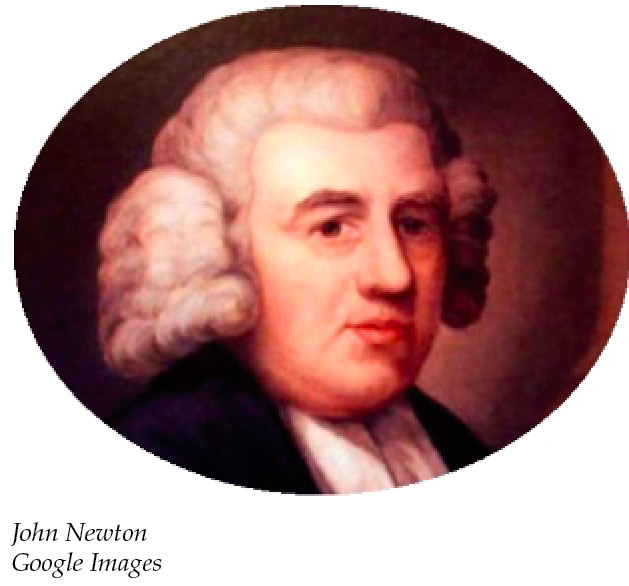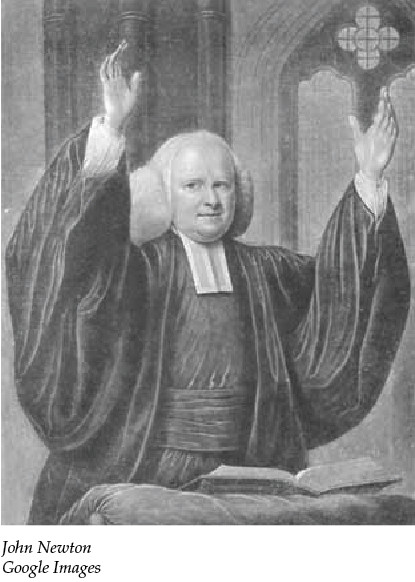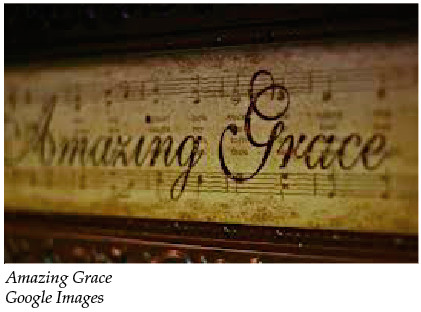John Newton’s life is a powerful testament to redemption and the transformative power of faith. Best known for penning the iconic hymn “Amazing Grace,” Newton’s journey from a rebellious youth and slave trader to an ordained minister is a remarkable story of divine grace. This hymn, “Amazing Grace,” resonates deeply with millions around the world, offering a message of hope and forgiveness that transcends cultures and generations. But to truly understand the hymn’s profound meaning, it’s essential to delve into the life of John Newton himself, a life marked by sin, struggle, and ultimately, salvation.
The Early Years and a Descent into Darkness
Amazing grace! (how sweet the sound) that saved a wretch like me! I once was lost, but now am found, was blind, but now I see.
Born in London in 1725, John Newton’s early life was shaped by contrasting influences. His father was a strict, seafaring man, while his mother was a devout Christian who instilled in him a love for the scriptures and the hymns of Isaac Watts. Tragically, his mother died when John was only six, a loss that deeply affected him. Though he initially aimed to honor her memory by becoming a preacher, his teenage years were marked by rebellion and a rejection of his mother’s faith.
At the age of eleven, Newton embarked on a life at sea with his father. He was ill-disciplined and prone to trouble, creating difficulties for himself and those around him. A period back home led to him being forcibly drafted into the Royal Navy. After deserting while on leave, he was publicly flogged, a brutal punishment that further hardened his heart. He was then transferred to a merchant ship bound for Africa, where he endured harsh treatment as an employee of a slave merchant. Newton himself described this period as being “a servant of slaves in Africa,” highlighting the depths of his degradation.
Seeking escape from this misery, Newton joined the crew of a slave ship, fully embracing a life devoid of moral restraint. He became notorious for his profanity, even shocking the ship’s captain, who was no stranger to coarse language himself. The horrific realities of the slave trade surrounded him, with enslaved African women and girls subjected to appalling conditions and exploitation. While Newton never explicitly confessed to abusing enslaved girls, he later acknowledged his moral corruption during this time, quoting 2 Peter 2:14: “Having eyes full of adultery, and that cannot cease from sin.” He later reflected on this dark chapter, stating, “The troubles and miseries…were my own. I brought them upon myself, by forsaking [God’s] good and pleasant paths and choosing the way of transgressors which I found very hard; they led to slavery, contempt, famine and despair.”
Grace Dawns Amidst a Storm
’Twas grace that taught my heart to fear, and grace my fears reliev’d; How precious did that grace appear, the hour I first believed!
In his despair, Newton contemplated suicide, tempted to throw himself into the sea. Yet, he later wrote, “The secret hand of God restrained me.” Two anchors held him back from complete self-destruction: the memory of his godly mother and his love for Mary Catlett, known as Polly, whom he had met in 1743.
 John Newton's portrait, capturing the thoughtful and reflective nature of the hymn writer.
John Newton's portrait, capturing the thoughtful and reflective nature of the hymn writer.
Despite these glimmers of hope, Newton remained entangled in the slave trade. He became an agent on the Guinea coast, seemingly prospering in this brutal business. He admitted to being “governed by present appearances, and looked no further.” However, divine providence was at work, guiding him towards an unexpected path of redemption.
In 1748, while sailing back to England on the Greyhound, a slave ship bound for the American colonies, Newton stumbled upon a copy of Thomas à Kempis’s The Imitation of Christ. Initially reading it out of boredom, he was suddenly struck by a profound question: “What if these things should be true?” This question marked the beginning of a spiritual awakening.
Soon after, a violent storm engulfed the ship, threatening to send it to the depths of the ocean. In the midst of the tempest, Newton cried out, “The Lord have mercy on us!” Although uttered flippantly at first, these words resonated deeply within him. He was instantly confronted with his own spiritual state: “What mercy can there be for me? The ship’s chief blasphemer, the loudest swearer, the man who mocked the Lord’s existence. What mercy can there be for me?”
Miraculously, the Greyhound survived the storm. This harrowing experience became Newton’s conversion moment. He marked March 21st as the anniversary of his spiritual rebirth, recognizing God’s hand in his survival. “He who takes notice of the cries of the young ravens in their nests,” Newton wrote, “was pleased to hear mine.” He began reading the New Testament, though he acknowledged his initial faith was “faint and wavering.”
Upon reaching Ireland, Newton attended church and received Communion, dedicating himself to God. However, his journey was far from over. During a subsequent voyage, he struggled to live up to his newfound faith, falling into despair and severe illness. This period of weakness became another turning point. He realized his utter dependence on God’s grace, confessing, “What a poor creature I am in myself, incapable of standing a single hour without continual fresh supplies of strength and grace from the fountain-head.”
A Life Rescued and Redirected by Grace
Thro’ many dangers, toils, and snares, I have already come; ’Tis grace has brought me safe thus far, and grace will lead me home.
John Newton’s life was indeed filled with dangers, toils, and snares, all overcome by grace. He faced a runaway horse as a child, sickness in Africa, numerous storms at sea, and even slave revolts. His labors were arduous, from working as a seaman and navy midshipman to being a slave trader’s servant. Spiritually, he was ensnared by deism, which led him to atheism, freeing him from the moral compass of his mother’s faith. “I believed my own lie,” he later confessed. Yet, through it all, God’s grace preserved him and guided him back to England.
The Lord has promis’d good to me, His Word my hope secures; He will my shield and portion be, as long as life endures.
God’s promise of good was fulfilled in Newton’s life, most notably in his marriage to Mary Catlett in 1750. Though initially, their spiritual paths differed, with John’s faith being a “faint dawn” and Polly’s being more conventional, their relationship deepened spiritually over time.
After marriage, Newton captained slave ships for three more voyages. During periods in Charleston, South Carolina, he attended church and sought spiritual solace in nature. On his final voyage, he met Captain Alexander Clunie, who profoundly impacted his understanding of grace as “the free and unmerited favor of God.”
 A portrait of John Newton during his later years as a minister, reflecting his wisdom and spiritual depth.
A portrait of John Newton during his later years as a minister, reflecting his wisdom and spiritual depth.
Despite his attempts to treat crew and enslaved people fairly, Newton grew increasingly troubled by his involvement in the slave trade. He yearned for “a more humane calling,” recognizing the “dreadful effects of the slave trade on the minds of those who engage in it.” He later reflected with shame on his past, acknowledging the horrors he had participated in. When the College of New Jersey (Princeton) offered him an honorary doctorate, he famously remarked that “the dreary coast of Africa had been his university” and that he would only accept a diploma “from the poor blacks.” He marveled at God’s mercy, stating, “I can see no reason why the Lord singled me out for mercy…unless it was to show, by one astonishing instance, that with Him ‘nothing is impossible.’”
In 1754, a severe illness prevented Newton from returning to sea. During his recovery in Chatham, he found peace walking in nature and studying the Bible, strengthening his resolve to pursue ministry. Despite lacking formal education and facing initial discouragement from church officials, Newton’s passion for ministry grew. His wife, Polly, encouraged patience, believing in God’s perfect timing.
Eventually, through the support of Lord Dartmouth, an evangelical patron, Newton was appointed curate of Olney in Buckinghamshire and ordained as a priest at nearly forty years old. He was embraced by the people of Olney, who were drawn to his genuine care and relatable preaching. His ministry focused on “breaking a hard heart and healing a broken heart.” His congregation flourished, attracting people from afar, including the poet William Cowper, who collaborated with Newton on the Olney Hymns in 1779. This collection included “Amazing Grace,” initially titled “Faith’s Review and Expectation.”
Newton’s ministry extended beyond Olney through his influential letters, published as Cardiphonia, or The Utterance of the Heart. His spiritual autobiography, An Authentic Narrative, also became widely read and cherished. In 1780, he became rector of St. Mary Woolnoth in London, a position he felt undeserved, considering his past. Yet, he thrived in London, attracting large crowds to his sermons, including a popular series based on Handel’s Messiah.
In his later years, Newton became a vocal abolitionist. His pamphlet, Thoughts upon the African Slave Trade, condemned the practice, and he actively supported William Wilberforce’s campaign to abolish the slave trade in Britain. He lived to witness the abolition in 1807, a triumph he deeply cherished.
The loss of his beloved Polly in 1790 was a profound blow. Their love story was exceptional, marked by deep affection and mutual support. His Letters to a Wife published after her death, are a testament to his love and grief. Even in mourning, his faith sustained him.
Yes, when this flesh and heart shall fail, and mortal life shall cease, I shall possess within the vail, a life of joy and peace.
The earth shall soon dissolve like snow, the sun forbear to shine; But God, who call’d me here below, will be forever mine.
John Newton continued to preach until his eyesight failed. Even in his old age, his sermons were powerful and Christ-centered. On his deathbed in 1807 at age eighty-two, he declared, “My memory is nearly gone. But I remember two things: that I am a great sinner, and that Christ is a great Saviour.” His epitaph summarized his life: “John Newton, once an infidel and libertine, a servant of slaves in Africa, was, by the rich mercy of our Lord and Saviour Jesus Christ, preserved, restored, pardoned, and appointed to preach the faith he had long labored to destroy.”
The Enduring Legacy of “Amazing Grace”
“Amazing Grace,” born from Newton’s profound experience of God’s mercy, has become one of the most beloved and recognizable hymns in the English-speaking world and beyond. After Newton’s death, the hymn crossed the Atlantic and gained immense popularity in America, particularly in the South. Set to the tune “New Britain” in William Walker’s 1835 hymnbook, The Southern Harmony, the hymn’s simple yet powerful melody enhanced its emotional impact.
 Sheet music excerpt of Amazing Grace, highlighting its simple yet powerful melody that resonates universally.
Sheet music excerpt of Amazing Grace, highlighting its simple yet powerful melody that resonates universally.
“Amazing Grace” resonated deeply within African American communities, becoming a spiritual anthem that echoed their own stories of suffering and hope. During the 20th century, it transcended denominational and racial boundaries, gaining popularity in gospel, folk, and even pop music. Recordings by Mahalia Jackson, Aretha Franklin, Judy Collins, and many others propelled the hymn into mainstream culture. Instrumental versions, like the bagpipe rendition by the Royal Scots Dragoon Guards, achieved phenomenal success.
While some interpret “Amazing Grace” as a song of self-reliance, its true power lies in its original message of divine rescue and unmerited grace, precisely as John Newton intended. It is a song that encapsulates his life story – a journey from profound sin to astonishing mercy – and continues to offer hope and inspiration to countless individuals seeking solace and redemption. “Amazing Grace” remains not only John Newton’s legacy but a timeless testament to the transformative power of faith and forgiveness.
